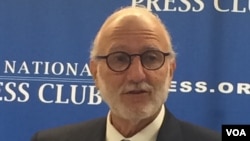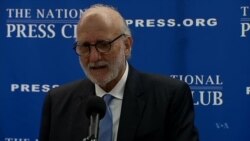December 3, 2009, was to be Alan Gross’ last night in Cuba, until he heard loud banging at his hotel room door.
Arrested by the Cuban government, he said he was found guilty 14 months later of being a threat to the integrity of the state and was sentenced to 15 years in maximum security.
Gross, who spoke Tuesday at the National Press Club in Washington, insists he had been contracted to develop a pilot project in three different Cuban communities to establish broadband Internet connectivity — and nothing else. But he ended up spending five years in prison.
Gross rejected claims that he risked arrest because he had been warned by the Cuban government about allegedly running a covert operation. “How can one run a covert operation when you make your travel arrangements through the Cuban government, you stay in hotels, rent a car or eat in restaurants owned by the Cuban government?” he asked.
'I Have Nothing'
Gross said that during his first year behind bars, he wrote a song, “No Tengo Nada,” meaning, "I Have Nothing." Gross said he had no TV, newspapers, books, paper or pens; even his dental floss was confiscated. He was in a cell 24 hours a day, seven days a week and saw only 20 minutes of sunlight the whole year.
The poor nutritional value of the prison food led to the loss of 70 pounds and five broken teeth for Gross. But the worst part of being there was isolation, he told the Washington journalists.
WATCH: Gross Discusses Cuban Productivity
Today, Gross' wife says he whistles a lot. And aside from the understandable joy of being able to spend time with his family and friends again, he can also walk six to nine kilometers a day in straight lines.
Conditions in prison were cramped. Now, “I don’t have to walk in circles anymore,” he said.
Gross said he would go back to Cuba in a heartbeat. He'll turn 67 soon and said that “five years out of that 67-year timeline" was a short period and didn't define him. "The other 62 years make me,” he said.
Gross praised President Barack Obama’s leadership and courage and said the president was doing the right thing by going to Cuba.
'Legacy item' for Obama
Obama’s trip to the island next week is timely, Gross said. “He does not have much time left in office. ... I think Cuba will be a legacy item for the president. I think he rightly will be discussing issues of human rights and, at the very least, abuses of power.”
He said that while normalization of relations would not occur for many years, it’s time to break from the past and work on a change in perspective. And if a journey of a thousand miles begins with but a single step, both the U.S. and Cuba have taken more than a single step, he said.
Gross' response to those members of Congress who have accused Obama of giving legitimacy to the Castro brothers was: “The Castro brothers are totally irrelevant to Cuba’s future.”
He said Cuba's 11.3 million people live in a virtual prison without much opportunity for growth and advancement. With his trip, Obama will not be delivering opportunity, Gross said, but "he’s bringing the hope for opportunity. He’s generated interest from private industry in the U.S., who will ultimately invest in Cuba.”
Cuba needs foreign direct investment, but there won’t be any until the long-standing trade embargo is lifted, Gross said, urging Congress to do just that.






